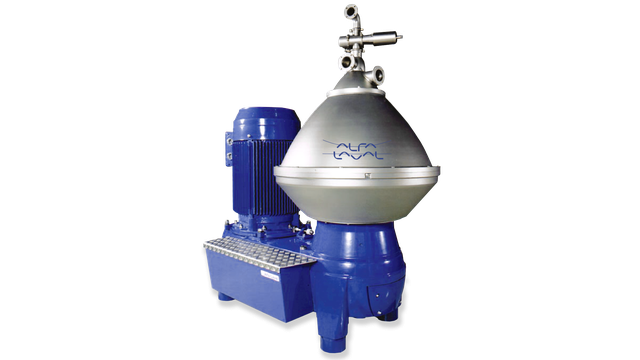MBUX
The Alfa Laval MBUX separators for recovery of yeast and other microorganisms take advantage of the fact that the slurry of concentrated solids is pseudo-plastic and flows easily in the bowl against the centrifugal force.This means that the recovered solids can be obtained with a low demand on energy in a closed system under pressure. Therefore, the hygienic conditions are very good and are further improved by a full-speed CIP procedure.
The MBUX separators are available in different sizes covering a wide range of process demands.
With the patented Alfa Laval self regulating vortex nozzles the concentration of discharged solids phase can be kept at a high and even level irrespective of fluctuations in the feed flow or feed concentration. The centrifuge can thus be operated closer to the clogging point without increasing the risk of clogging.
The light and heavy phase are both discharged under pressure which prevents foaming and simplifies installation by eliminating pump systems and improves the hygiene. Solids pockets in the bowl guide the solids to the concentrate tubes, preventing accumulation of firmly packed solids and making separation and Cleaning In Place (CIP) easier and more effective.
Automated CIP at full speed
The bowl can be opened intermittently during production and/or the cleaning cycle for ejections of solids while the machine continues to run at full speed. Frame hood is fitted with a spray nozzle for washing the outside of the bowl.
Standard design
All liquid-wetted parts are in high-grade stainless steel, including bowl body in Super Duplex stainless steel, and rubber sealings food approved EPDM or nitrile rubber. The separator is equipped with speed and vibration sensors. The anchoring feet are equipped with vibration dampers. The MBUX separator is driven by a flange-mounted motor. The separator is delivered with the motor pre-mounted at the factory so there is no need for alignment on site.
Benefits
- Self-regulating vortex nozzles for optimal concentrate dryness and minimum clogging risk
- Hygienic design
How it works
Separation takes place in the disc type bowl which is equipped with concentrate tubes and vortex nozzles. The heavy solids phase moves outwards with the centrifugal force in to the solids pockets at the bowl periphery and from there through concentrate tubes and internal vortex nozzles into the paring tube chamber, where the concentrate is skimmed off by the paring tube and discharged under pressure. The clarified liquid phase is displaced towards to the centre through the disc stack. This phase is then discharged under pressure by means of a built in paring disc. The valve slide under the bowl bottom opens the discharge valves momentarily, permitting the ejections of solids.
Self-regulating vortex nozzles
The unique vortex nozzles automatically compensate for variations in the feed flow rate or feed solids concentration to ensure a constant concentration of the discharge solids phase.
The self-regulating feature is based on the relationship between the viscosity of the liquid entering the vortex chamber and the effect of its rotation velocity on the pressure drop.
The concentrate enters the chamber of the vortex nozzle tangentially at the periphery, forms a whirl in the vortex chamber and leaves through a hole in the centre of the nozzle. The inlet and outlet pressure of the liquid is similar to normal pressure drops. In principle, these pressure drops are not affected by the viscosity of the concentrate. The pressure drop created by the whirl of the concentrate in the vortex chamber is high if the rotation velocity is high, and low at low velocities.

